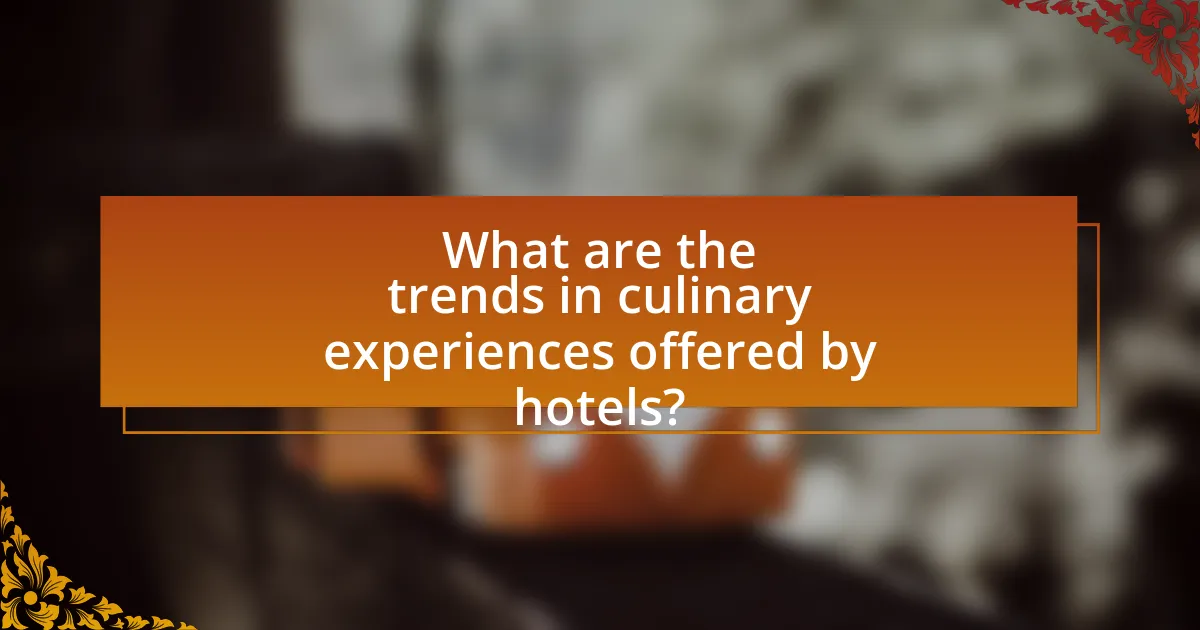Unique hotel experiences for foodies encompass immersive cooking classes and curated tastings that allow guests to engage with local culinary traditions. These experiences often include hands-on sessions with renowned chefs, where participants learn to prepare regional dishes using fresh ingredients, as well as exclusive tastings that highlight local wines and cuisines. The article explores the benefits of cooking classes and tastings, including enhanced guest satisfaction, cultural immersion, and the development of culinary skills. It also discusses the variety of classes offered, regional variations, and the growing trend of incorporating local ingredients into hotel dining experiences, making culinary offerings a vital aspect of modern hospitality.

What are Unique Hotel Experiences for Foodies?
Unique hotel experiences for foodies include immersive cooking classes and curated tastings that allow guests to engage directly with local culinary traditions. Many hotels partner with renowned chefs to offer hands-on cooking sessions, where participants learn to prepare regional dishes using fresh, local ingredients. For example, the Four Seasons Hotel in Florence provides a cooking class that features traditional Tuscan recipes, enhancing the experience with a visit to a local market to select ingredients. Additionally, hotels often host exclusive wine or food tastings, such as the Ritz-Carlton in Napa Valley, which offers wine pairing dinners that showcase local vineyards. These experiences not only provide culinary education but also foster a deeper appreciation for the local culture and gastronomy.
How do cooking classes enhance the hotel experience for foodies?
Cooking classes enhance the hotel experience for foodies by providing immersive culinary education and hands-on engagement with local cuisine. These classes allow guests to learn from professional chefs, gaining insights into regional ingredients and cooking techniques that reflect the local culture. For instance, a study by the Culinary Institute of America found that 70% of participants in cooking classes reported a deeper appreciation for the culinary arts and local food traditions. This interactive experience not only enriches guests’ knowledge but also fosters a sense of community among participants, making their stay more memorable and enjoyable.
What types of cooking classes are commonly offered in hotels?
Hotels commonly offer a variety of cooking classes, including regional cuisine classes, baking and pastry workshops, and healthy cooking sessions. Regional cuisine classes focus on local dishes and ingredients, allowing participants to learn traditional cooking techniques specific to the area. Baking and pastry workshops teach skills related to desserts and bread-making, often featuring signature recipes from the hotel’s culinary team. Healthy cooking sessions emphasize nutritious meal preparation, catering to guests interested in wellness and dietary considerations. These offerings enhance the guest experience by providing hands-on culinary education and a deeper connection to the local culture.
How do cooking classes vary by region or cuisine?
Cooking classes vary significantly by region and cuisine, reflecting local ingredients, traditions, and culinary techniques. For instance, Italian cooking classes often emphasize pasta-making and regional sauces, while Thai classes focus on balancing flavors with fresh herbs and spices. In contrast, French cooking classes typically cover techniques like soufflé preparation and pastry making, showcasing the country’s rich culinary heritage. These variations are rooted in the cultural significance of food in each region, as evidenced by UNESCO recognizing the Mediterranean diet as an Intangible Cultural Heritage. Thus, the diversity in cooking classes is a direct reflection of the unique culinary identities shaped by geography and history.
What role do tastings play in unique hotel experiences for foodies?
Tastings play a crucial role in unique hotel experiences for foodies by providing an immersive opportunity to explore local cuisine and flavors. These curated tasting events allow guests to sample a variety of dishes and beverages, often highlighting regional ingredients and culinary traditions. For instance, hotels may offer wine tastings that feature local vineyards, enhancing the guest’s understanding of the area’s gastronomic culture. Additionally, tastings often include expert guidance from chefs or sommeliers, enriching the experience with insights into food pairings and preparation techniques. This interactive element not only elevates the dining experience but also fosters a deeper connection between guests and the local culinary scene.
What types of tastings can guests expect at hotels?
Guests at hotels can expect a variety of tastings, including wine tastings, cheese tastings, chocolate tastings, and local cuisine tastings. These experiences are often curated to highlight regional specialties and enhance the culinary experience during their stay. For instance, many hotels partner with local wineries to offer exclusive wine tastings that showcase the area’s best vintages, while gourmet hotels may provide cheese tastings featuring artisanal products from nearby farms. Additionally, some hotels organize chocolate tastings that allow guests to sample high-quality chocolates from renowned chocolatiers, further enriching their gastronomic journey.
How do tastings complement the overall culinary experience?
Tastings enhance the overall culinary experience by allowing individuals to sample a variety of flavors and dishes in a single setting. This approach not only broadens the palate but also fosters a deeper appreciation for the ingredients and techniques used in cooking. For instance, wine tastings often highlight the nuances of different varietals, showcasing how terroir influences flavor profiles, which can lead to a more informed dining experience. Additionally, tastings encourage social interaction and conversation, as participants share their impressions and preferences, creating a communal atmosphere that enriches the enjoyment of food.
Why are unique culinary experiences important for travelers?
Unique culinary experiences are important for travelers because they provide an authentic connection to local culture and traditions. Engaging in cooking classes or tastings allows travelers to immerse themselves in the culinary practices of a region, enhancing their understanding of its history and lifestyle. For instance, studies show that food is a significant aspect of cultural identity, with 70% of travelers indicating that trying local cuisine is a top priority during their trips. This engagement not only enriches the travel experience but also fosters a deeper appreciation for the destination, making unique culinary experiences a vital component of travel.
How do these experiences contribute to cultural immersion?
Experiences such as cooking classes and tastings contribute to cultural immersion by allowing participants to engage directly with local culinary traditions and practices. These activities provide hands-on learning opportunities that deepen understanding of regional ingredients, cooking techniques, and cultural significance behind various dishes. For instance, a cooking class in Italy may involve using traditional recipes passed down through generations, thereby connecting participants to the local heritage. This direct interaction fosters a more profound appreciation for the culture, as individuals not only taste the food but also learn the stories and customs associated with it.
What impact do culinary experiences have on guest satisfaction?
Culinary experiences significantly enhance guest satisfaction by providing memorable and engaging interactions with food. These experiences, such as cooking classes and tastings, allow guests to connect with local culture and cuisine, fostering a deeper appreciation for their surroundings. Research indicates that 70% of travelers consider food experiences a key factor in their overall satisfaction during trips, highlighting the importance of culinary offerings in hospitality. By integrating unique culinary experiences, hotels can create lasting impressions that lead to positive reviews and repeat visits.
How can guests find the best unique hotel experiences for foodies?
Guests can find the best unique hotel experiences for foodies by researching hotels that offer specialized culinary programs, such as cooking classes and tastings. Many hotels partner with local chefs or culinary schools to provide immersive experiences that highlight regional cuisine. For instance, hotels like the Four Seasons and Ritz-Carlton frequently feature gourmet dining options and cooking workshops led by renowned chefs, allowing guests to engage directly with the culinary arts. Additionally, online platforms like TripAdvisor and Yelp provide reviews and recommendations from previous guests, helping food enthusiasts identify hotels that excel in unique culinary offerings.
What should travelers consider when choosing a hotel for culinary experiences?
Travelers should consider the hotel’s culinary offerings, including on-site restaurants, cooking classes, and local food tours. A hotel with acclaimed chefs or unique dining concepts enhances the culinary experience. For instance, hotels that partner with local farms or markets often provide fresh, regional ingredients, which can elevate the quality of meals. Additionally, checking guest reviews and ratings on culinary experiences can provide insights into the authenticity and quality of the food offerings.

What are the benefits of cooking classes in hotels?
Cooking classes in hotels provide guests with hands-on culinary experiences that enhance their stay. These classes foster engagement with local cuisine, allowing participants to learn traditional cooking techniques and recipes that reflect the region’s culture. Additionally, cooking classes promote social interaction, as guests often collaborate and share experiences, creating a sense of community. According to a study by the Culinary Institute of America, experiential learning, such as cooking classes, significantly increases guest satisfaction and can lead to positive reviews and repeat visits.
How do cooking classes foster community among guests?
Cooking classes foster community among guests by encouraging collaboration and interaction in a shared learning environment. Participants engage in hands-on cooking activities, which require teamwork and communication, thereby building relationships. Research indicates that social cooking experiences can enhance bonding and create a sense of belonging, as guests share their culinary skills and cultural backgrounds. This communal aspect is further supported by studies showing that group cooking activities can lead to increased social cohesion and improved interpersonal connections among participants.
What social dynamics are created in group cooking classes?
Group cooking classes foster collaboration, communication, and social bonding among participants. These classes create an environment where individuals work together to achieve a common goal, enhancing teamwork and interpersonal skills. Research indicates that shared cooking experiences can lead to increased trust and rapport among participants, as they navigate tasks and share responsibilities. Additionally, the informal setting encourages conversation and interaction, breaking down social barriers and promoting inclusivity. Studies show that such group activities can enhance social cohesion, making participants feel more connected to one another and to the culinary experience.
How do cooking classes encourage interaction with local chefs?
Cooking classes encourage interaction with local chefs by providing a structured environment where participants can engage directly with culinary professionals. These classes often feature hands-on cooking sessions led by chefs who share their expertise, techniques, and local culinary traditions. This direct engagement allows participants to ask questions, receive personalized feedback, and gain insights into the local food culture, enhancing their overall experience. Additionally, many cooking classes are designed to foster a communal atmosphere, where participants can collaborate and interact not only with chefs but also with each other, further enriching the learning experience.
What skills can guests learn from hotel cooking classes?
Guests can learn various culinary skills from hotel cooking classes, including knife techniques, ingredient selection, cooking methods, and plating presentation. These classes often cover fundamental skills such as chopping, sautéing, and baking, which are essential for preparing a wide range of dishes. Additionally, guests may gain knowledge about flavor pairing, seasoning, and the use of herbs and spices, enhancing their overall cooking proficiency. Many hotel cooking classes also emphasize the importance of food safety and hygiene practices, ensuring that participants understand how to handle ingredients properly.
How do these skills enhance guests’ culinary abilities at home?
These skills enhance guests’ culinary abilities at home by providing practical techniques and knowledge that can be directly applied in their own kitchens. Guests learn essential cooking methods, ingredient selection, and flavor pairing during cooking classes, which empowers them to recreate restaurant-quality dishes. For instance, studies show that hands-on cooking experiences significantly improve participants’ confidence and competence in meal preparation, leading to more frequent home cooking and experimentation with new recipes. This transfer of skills from a structured learning environment to personal cooking practices fosters creativity and enhances overall culinary proficiency.
What unique techniques or recipes are often taught in these classes?
Unique cooking classes often teach techniques such as sous-vide cooking, fermentation, and molecular gastronomy. These methods allow participants to explore innovative culinary practices that enhance flavor and presentation. For example, sous-vide cooking involves vacuum-sealing food and cooking it at precise temperatures, resulting in perfectly cooked dishes. Fermentation techniques, like making kimchi or yogurt, introduce participants to the science of preserving and enhancing flavors through natural processes. Molecular gastronomy incorporates scientific principles to create unique textures and presentations, such as spherification, which transforms liquids into gel-like spheres. These techniques are increasingly popular in culinary education, reflecting current trends in the food industry.

What are the trends in culinary experiences offered by hotels?
Hotels are increasingly offering immersive culinary experiences that cater to food enthusiasts. These trends include farm-to-table dining, where hotels source ingredients locally to enhance freshness and sustainability, and interactive cooking classes that allow guests to learn from professional chefs. Additionally, themed dining events, such as wine pairings or regional cuisine nights, are becoming popular, providing guests with unique cultural experiences. According to a 2022 report by the American Hotel and Lodging Educational Institute, 65% of travelers prioritize culinary experiences when choosing accommodations, highlighting the growing demand for such offerings in the hospitality industry.
How are hotels innovating their culinary offerings?
Hotels are innovating their culinary offerings by integrating local ingredients and cultural experiences into their menus. This approach not only enhances the authenticity of the dining experience but also supports local farmers and producers. For instance, many hotels are now hosting farm-to-table dining events, where guests can enjoy meals prepared with fresh, locally sourced ingredients. Additionally, hotels are offering interactive culinary experiences such as cooking classes and tastings, allowing guests to engage directly with chefs and learn about regional cuisines. This trend is supported by a growing consumer preference for unique and immersive dining experiences, as evidenced by a report from the American Hotel and Lodging Educational Institute, which highlights that 70% of travelers seek out local food experiences when staying at hotels.
What new formats are emerging for cooking classes and tastings?
New formats emerging for cooking classes and tastings include virtual classes, pop-up events, and immersive culinary experiences. Virtual classes have gained popularity due to their accessibility, allowing participants to join from anywhere while interacting with chefs in real-time. Pop-up events offer unique, temporary dining experiences that often feature local ingredients and themes, attracting food enthusiasts looking for novelty. Immersive culinary experiences, such as farm-to-table tours or hands-on workshops in unique settings, provide participants with a deeper connection to the food they prepare and consume. These formats reflect a growing trend towards personalization and experiential learning in the culinary arts.
How are hotels incorporating local ingredients into their culinary experiences?
Hotels are incorporating local ingredients into their culinary experiences by partnering with local farms and producers to source fresh, seasonal items for their menus. This practice not only enhances the authenticity of the dishes served but also supports the local economy and reduces the carbon footprint associated with food transportation. For example, many hotels now feature farm-to-table dining concepts, where chefs create menus based on the availability of local produce, meats, and dairy. Additionally, some hotels offer cooking classes that highlight these local ingredients, allowing guests to engage directly with the culinary culture of the region. This approach has been shown to increase guest satisfaction and create a unique dining experience that reflects the local heritage and flavors.
What are the most popular destinations for culinary-focused hotel stays?
The most popular destinations for culinary-focused hotel stays include cities renowned for their food culture, such as Tokyo, Paris, and Barcelona. Tokyo offers a blend of traditional and modern cuisine, with hotels like the Mandarin Oriental providing cooking classes and gourmet dining experiences. Paris is famous for its culinary schools and patisseries, with hotels like Le Meurice offering guests the chance to learn French cooking techniques. Barcelona is known for its vibrant tapas scene, and hotels such as the Hotel Arts Barcelona feature culinary workshops that highlight local Catalan cuisine. These destinations are validated by their rich culinary traditions and the availability of unique food experiences within their hospitality offerings.
Which regions are known for their unique culinary experiences?
Regions known for their unique culinary experiences include Tuscany in Italy, known for its rich flavors and local wines; Sichuan in China, famous for its bold and spicy dishes; and Oaxaca in Mexico, celebrated for its diverse ingredients and traditional cooking methods. Tuscany offers cooking classes that highlight fresh, local produce and traditional recipes, while Sichuan’s culinary scene is characterized by its use of Sichuan peppercorns and complex flavors. Oaxaca is renowned for its mole sauces and artisanal mezcal, providing immersive culinary experiences that reflect its cultural heritage.
How do local cultures influence hotel culinary offerings?
Local cultures significantly influence hotel culinary offerings by shaping the ingredients, cooking techniques, and traditional dishes featured in menus. Hotels often incorporate regional flavors and local produce to create authentic dining experiences that reflect the cultural heritage of their location. For instance, a hotel in Italy may offer homemade pasta and regional wines, while a hotel in Thailand might feature dishes like Pad Thai and Tom Yum, utilizing local herbs and spices. This approach not only enhances guest satisfaction but also supports local farmers and producers, fostering a sense of community and sustainability.
What tips can enhance your culinary hotel experience?
To enhance your culinary hotel experience, participate in cooking classes and tastings offered by the hotel. Engaging in these activities allows you to learn from professional chefs and gain hands-on experience with local ingredients and cooking techniques. Research indicates that immersive culinary experiences can significantly increase guest satisfaction and create lasting memories, as highlighted in a study by the Cornell University School of Hotel Administration, which found that experiential offerings lead to higher guest engagement and loyalty.

